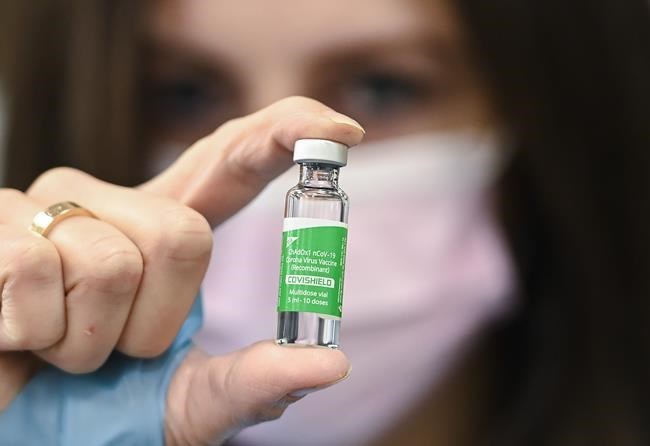OTTAWA — Health Canada's chief medical adviser says there is no scientific explanation to suggest a link between the Oxford-AstraZeneca COVID-19 vaccine and blood clots.
Dr. Supriya Sharma says Health Canada has a "really low threshold" for adverse events that could trigger a pause in the use of a vaccine and wouldn't hesitate to do so if something warranted it.
But she says the science is not there to suggest the Oxford-AstraZeneca vaccine could be the reason some patients in Europe developed blood clots after they received it.
"There's not a good biological explanation about why a vaccine of this type, injected into a muscle, would cause that kind of adverse event," said Sharma, in an interview with The Canadian Press.
Denmark, Iceland, Norway and Bulgaria are among almost a dozen European nations that paused the use of Oxford-AstraZeneca's vaccine this week — either entirely or specific batches of it — after reports of some patients developing blood clots afterward. None of them said there was evidence of a link, but that the pause was out of an abundance of caution pending a review.
Austria stopped using a doses from a batch of the vaccine earlier this week after two reports of blood clots, but experts there concluded neither was related to the vaccine. Austria's chancellor, Sebastian Kurz, said Friday he would be willing to get the shot himself to show how much trust he has in it.
Many other countries, including Germany, France, Poland, Nigeria, the United Kingdom and Canada, are sticking with AstraZeneca injections, citing a lack of any evidence showing a link.
The vaccine has been authorized in 74 countries, and by the World Health Organization, and 16 million doses have been injected in the U.K. and Europe alone.
Canada approved it Feb. 26, and the first 500,000 doses were distributed to provinces this week, just as the blood-clot concerns began to go public.
Lucilia Pato, who got her first dose Friday morning at the Junction Chemist in west Toronto, said news that some European countries had stopped using AstraZeneca's vaccine for now initially gave her pause.
"I was (worried) when I heard about it yesterday but this morning I heard positive things about it, so you know what, I was willing to take my chance," she said.
The European Medicines Agency, which regulates new drugs for the European Union, said in a statement Thursday it was not suspending its authorization for AstraZeneca's vaccine.
"There is currently no indication that vaccination has caused these conditions, which are not listed as side-effects with this vaccine," the EMA said.
Sharma said reviews of adverse events are normal following the release of a new drug or vaccine.
"Once the vaccines are used in the wild, and by millions of people, these things will come up," she said. "So we're already in a system where we're expecting things to pop up and that's why we have these vigilance systems to be able to detect it."
Sharma said the first question always to be asked is if there is something scientific to explain a link between an adverse event and a vaccine.
"And when we're looking at the AstraZeneca vaccine, as an example, there's not in this case," she said.
She said regulators also ask whether the number of patients experiencing the effect is higher than what might normally be seen in the population and whether there is some other factor common to all the patients with the issue.
The answer to each question here is also no.
Finally, Sharma said regulators will consider the possibility of a manufacturing mistake with a particular batch. While there is no evidence of that in Europe either, Canada's doses of the Oxford-AstraZeneca vaccine are also not coming from the same source as Europe's.
The doses of the vaccine currently being used in Canada were produced at the Serum Institute of India.
Canada has authorized four distinct vaccines for COVID-19, and almost 2.8 million doses have been injected.
Sharma said thus far, none has produced "adverse events" in Canada that were either unexpected or more frequent than expected.
She said Health Canada won't be slow to act on safety concerns. The people making these decisions are aware it's not just Canadians as a whole, but themselves and their loved ones who will be getting the same vaccines.
"These are our fathers, brothers, sisters, mothers," she said. "We want to make sure that we're doing the best for all of them as well."
This report by The Canadian Press was first published March 12, 2021.
—With files from Paola Loriggio in Toronto
Mia Rabson, The Canadian Press



